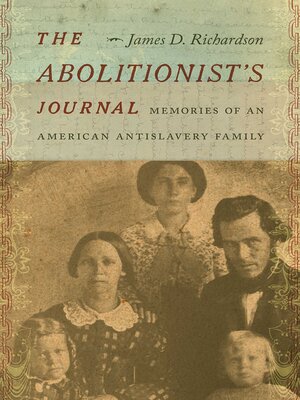The Abolitionist's Journal
ebook ∣ Memories of an American Antislavery Family
By James D. Richardson

Sign up to save your library
With an OverDrive account, you can save your favorite libraries for at-a-glance information about availability. Find out more about OverDrive accounts.
Find this title in Libby, the library reading app by OverDrive.



Search for a digital library with this title
Title found at these libraries:
| Library Name | Distance |
|---|---|
| Loading... |
Over the course of more than twenty years, James D. Richardson and his wife, Lori, retraced the steps of his ancestor, George Richardson (1824–1911), across nine states, uncovering letters, diaries, and more memoirs hidden away Their journey brought them to the brink of the racial divide in America, revealing how his great-great-grandfather Richardson played a role in the Underground Railroad, served as a chaplain to a Black Union regiment in the Civil War, and founded a college in Texas for the formerly enslaved.
In narrating this compelling life, The Abolitionist's Journal explores the weight of the past as well as the pull of one's ancestral history. The author raises questions about why this fervent commitment to the emancipation of African Americans was nearly forgotten by his family, exploring the racial attitudes in the author's upbringing and the ingrained racism that still plagues our nation today.
As America confronts a generational reckoning on race, these important perspectives add a layer to our larger national story.
In narrating this compelling life, The Abolitionist's Journal explores the weight of the past as well as the pull of one's ancestral history. The author raises questions about why this fervent commitment to the emancipation of African Americans was nearly forgotten by his family, exploring the racial attitudes in the author's upbringing and the ingrained racism that still plagues our nation today.
As America confronts a generational reckoning on race, these important perspectives add a layer to our larger national story.







